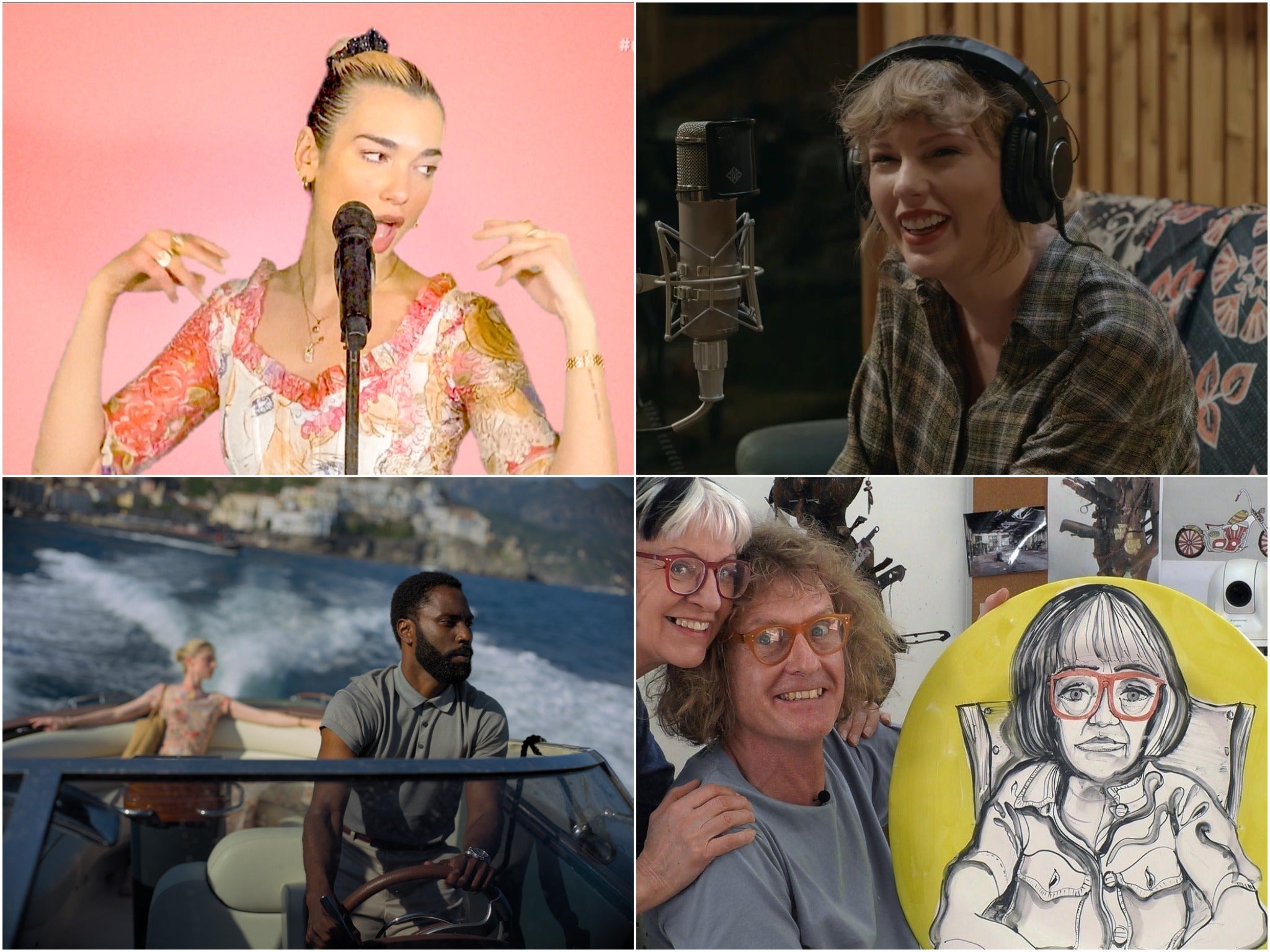From Folklore to Tenet to Kitchen Disco – the year the arts became more necessary than ever
Covid changed everything in 2020, but artists, musicians and writers set out to inspire, guide and comfort us, says Rupert Hawksley, and we discovered new ways of interacting with them


You may have recovered by now, in which case consider yourself lucky. Not everyone has been so fortunate. I acknowledge that and haven’t taken the decision to bring it up lightly. But you’re not alone and it’s good to talk.
So here goes: a little over nine months ago, on Thursday 19 March, Gal Gadot led a celebrity singalong to John Lennon’s “Imagine”. I won’t call it a cover; it was more like a sober karaoke session. Gadot started it – “Imagine there’s no heaven” – and then Kristen Wiig croaked out a line, and then Aaron Paul, and Natalie Portman, and Will Ferrell, and… who the hell is that? And why won’t someone make it stop?
But, you know, it was that kind of year. Nothing was as it had been before. Nothing is. And as the year wore on, artists, musicians and writers set out with generosity and purpose to inspire, guide and comfort us. And it made us feel better. The arts bent themselves into new shapes, new works, new ways – and we discovered new ways of interacting with them.
The biggest recording artist in the world, Taylor Swift, released two number one albums – two! – in folklore and evermore, for all the world as if this was the Sixties, when The Beatles were knocking out Help and Rubber Soul within four months of one another. It made a difference to know that while we were just getting by – remember puzzles and Zoom quizzes? – at home in the US, Swift literally could not stop writing songs. I suppose that’s the difference.
Things we might have been sniffy about before became urgent and necessary. OK, so we’d rather watch a gig in a sweaty club, but this year, we couldn’t. And the alternative was nothing like as bad as expected. Fontaines DC performed live from Kilmainham Gaol in July. It was committed and heart-stirring and I felt as energised afterwards as if I’d seen them in the flesh. And there was no train home to catch.

Meanwhile, Dua Lipa’s 2054 livestream show in November, from the south London superclub Printworks, was glam disco pop in all its splendour. It attracted more than five million viewers, considerably more than the 5,000 that would have thronged this giant venue, and brought a shiny parade of on-set guests from Kylie to FKA Twigs. And when Nick Cave sang live from Alexandra Palace (“I’m just waiting for you, waiting for you, waiting for you”), I shed a tear, precisely because of the circumstances.
It has been distressing to see theatres and cinemas and galleries forced to close – we want you back – but the pandemic has forced artists to engage with their audience in a more intimate way and it has been thrilling. I can’t recall a time when the arts have felt more inclusive and democratic: none of us could go out, so all of us had to stay in. This, in turn, meant that everyone had access to the same offerings. It has been a truly communal experience.
Two things stood out for me. The first was Grayson’s Art Club on Channel 4, a six-part series which Grayson and Philippa Perry recorded during the first lockdown. Grayson shuffled about the studio in his paint-splattered slacks, sometimes eating a banana, but mostly laughing and spinning wonky pots. He and Philippa would then encourage viewers to send photographs of their own lockdown art, almost all of which was awful. It was as pure an illustration of art for art’s sake as you could wish for. Arriving at a moment of fear and uncertainty for the country, it reminded us, more I think than any exhibition, of the exhilarating, transformative effect of... just making things.
The second was Sophie Ellis-Bextor’s Kitchen Disco, which did exactly as it said on the tin. Ellis-Bextor, fully glammed up, threw a series of house parties on social media to which she provided the soundtrack – and we were all invited. They were ramshackle, stop-start affairs – “my kids are getting bored because, you see, I do this gig for them every night” – but they caught something of the madness of this surreal year. So much fun, so full of life, and yet only happening because of the pandemic.
And, of course, they felt real, because we all went slightly mad this year. It made a strange kind of sense to see Ellis-Bextor dancing round the kitchen with her son dressed up as Spider-Man.
Like many, I felt the loss of cinemas particularly keenly and while Christopher Nolan’s Tenet, released over the summer, provided some optimism, the postponement of the new James Bond film, No Time To Die, felt callous – in a year when we have all had to pull together, the decision to put profits ahead of livelihoods jarred.
But the diminishing of the big screen allowed the small screen to thrive. BBC Two comedy Staged, starring David Tennant and Michael Sheen, was filmed entirely over Zoom and was an unexpected triumph: intense and weird and claustrophobic. In fact, the pandemic ushered in a whole new genre of television, characterised by short episodes, shot remotely, often on shaky cameras. ITV broadcast the excellent, sobering Isolation Stories, featuring Sheridan Smith. It was all much rougher and more immediate than we are used to, but no less exciting for that. Stripped of studio effects, the actors were exposed. The very best of them thrived.
Line of Duty star Rochenda Sandall delivered Alan Bennett’s monologue The Outside Dog to a sold-out, socially-distanced audience at the Bridge Theatre in London in September – but we all had a chance to see a version of it recorded at the theatre in April/May, when BBC Two showed a new series of Bennett’s famous monologues in June. Sandall would later return as Black Panther Barbara Beese in Mangrove, the first of Steve McQueen’s brilliant Small Axe series on BBC One in November.
Shows such as I May Destroy You, Normal People and Industry would doubtless have been popular anyway but as we watched them, stuck at home, they became more cherished – as a means of escape. The clubbing scenes in I May Destroy You felt more vivid, surely, as they recalled a world that was, however temporarily, cordoned off.
It is to be hoped, of course, that 2021 brings better news for the arts. Few things would confirm that we are back to normal more than the return of music festivals, West End shows and crowded exhibition openings. But it would be a mistake to write 2020 off as a year when the arts perished. Far from it. In the most trying circumstances, creativity blossomed in new and unexpected ways. The Royal Academy’s Summer Exhibition even arrived in winter – the perfect illustration of a year turned upside down. But hey, it’s nearly over and we got there, nudged along every step of the way by the arts. What a relief. And to think that when Gal Gadot started singing all the way back in March, I doubted any of it would happen. Imagine that.
Join our commenting forum
Join thought-provoking conversations, follow other Independent readers and see their replies
Comments
Bookmark popover
Removed from bookmarks